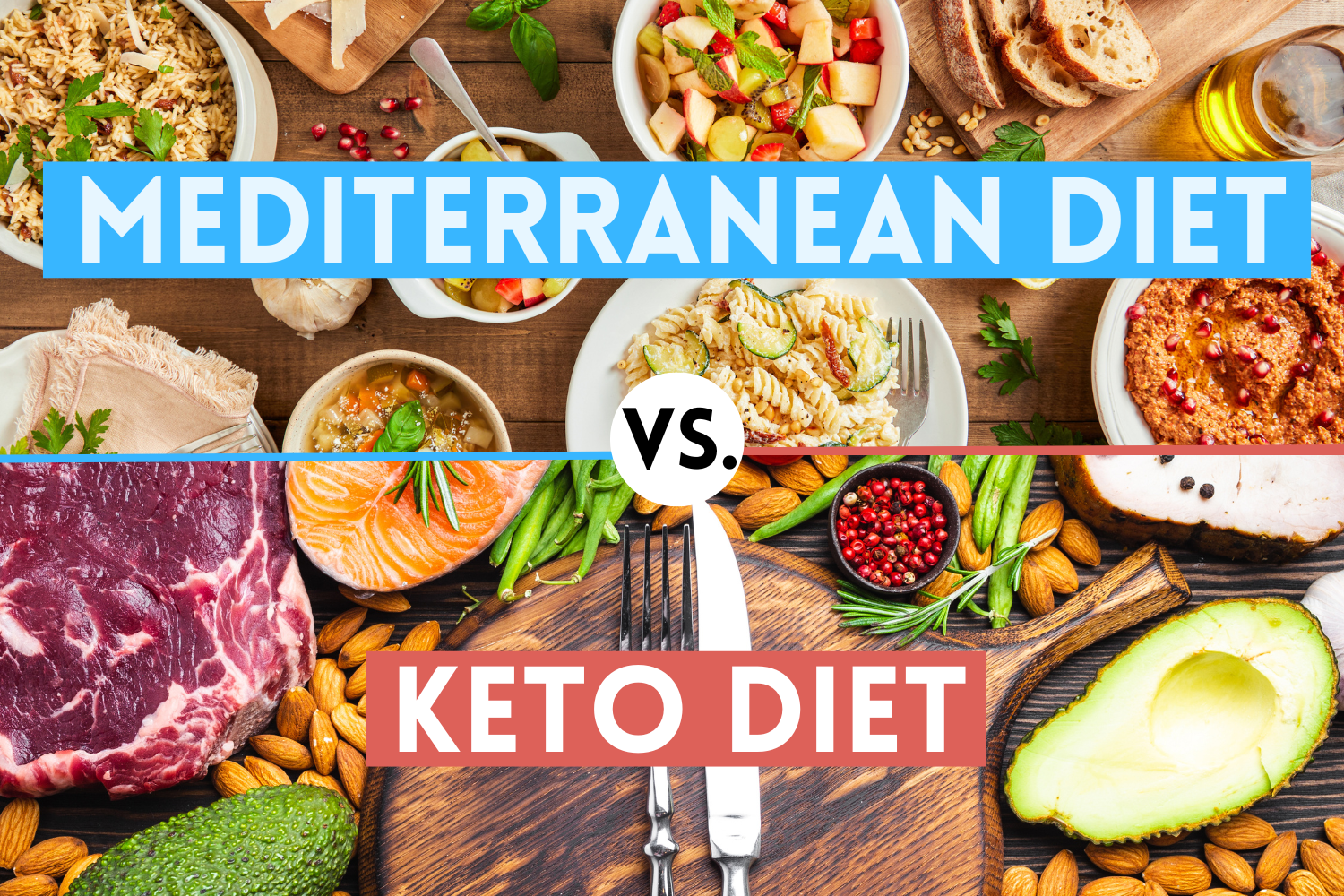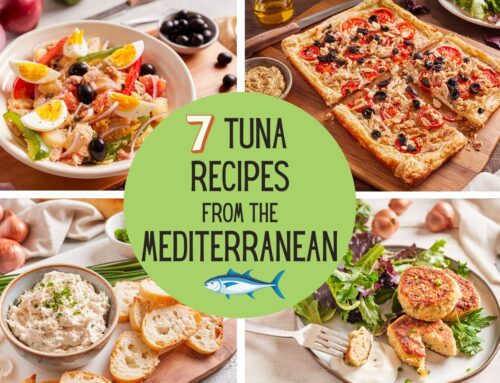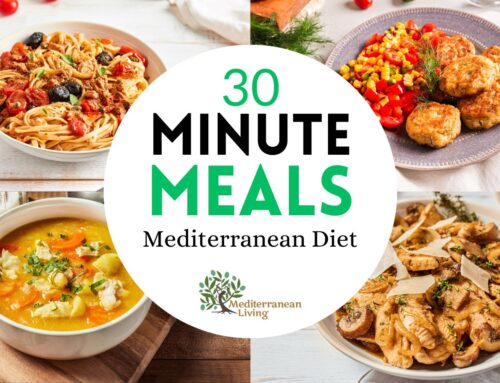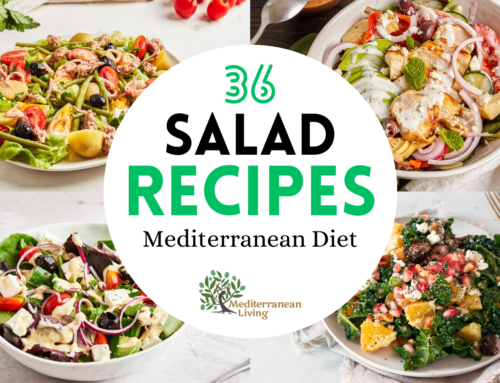Mediterranean Diet Vs Keto: A Practical Deep Dive
By Mediterranean Living
Updated March 1, 2023
This in-depth comparison of the Mediterranean diet vs Keto will help you decide which one of these popular diets fits your needs.
The Mediterranean diet focuses on healthy whole foods, while keto emphasizes carb restriction. Learn which one is the right choice for you.

The Mediterranean eating pattern as we know it today has existed for centuries or longer, while the ketogenic diet is a relative newcomer to the scientific scene, receiving recognition just over a century ago when it was first used to treat epilepsy successfully.
Upon initial examination, these two diets don’t have much in common, but they’re two of the most compelling and research-backed nutritional strategies known today.
In this guide, you’ll learn the similarities and differences between the Mediterranean and keto diets, pros and cons, how they compare in terms of weight loss, heart health, brain health, longevity, and more, plus practical tips and resources to help you make the most of whichever diet is the best fit for your needs.
Mediterranean Diet vs. Ketogenic Diet: Similarities and Differences
Similarities between the Mediterranean and keto diets include an overarching emphasis on whole foods and healthy fats, while the most pronounced differences are found in areas like macronutrients, the nutritional value of staple foods, and a focus (or lack thereof) on other lifestyle changes besides diet.
Macronutrients
Macronutrients — the amounts of carbs, protein, and fats you consume daily — are the single biggest difference between the Mediterranean and keto diets.
You don’t have to count macros or calories on the Mediterranean diet. The Mediterranean diet doesn’t make any prescription for exact macronutrient ratios.

Instead, users focus on eating diverse, healthy whole foods. Depending on your individual needs and metabolism, you might choose to emphasize carbs for energy, fats for fullness, or protein for recovery and athletic performance. But it’s also fine to simply make healthy recipes you enjoy and never think about macros!
In contrast, the keto diet is less flexible and more restrictive. By definition, you must count and restrict carbohydrates on keto. Most people can’t achieve ketosis without drastically cutting their carb intake. The typical carb intake on keto is 20 grams or fewer or daily net carbs, which are all carbs listed on food labels minus dietary fiber and sugar alcohols.
After lowering carbs, most calories on keto come from dietary fats. The most common keto macro recommendations are to eat 5% or fewer of calories from carbs each day, 65-80% of calories from dietary fats, and the rest of daily calories (15-30%) from protein.
While it may sound quite technical, keto still isn’t very complicated as long as you’re willing to track your carb intake. And, like the Mediterranean diet, calorie counting isn’t a requirement on keto.
Whole Foods
Ultra-processed junk foods with refined sugars, starches, and processed seed oils are a common cause of obesity and other health problems according to studies. The Mediterranean diet and the keto diet both exclude these types of foods, which is a big positive for your health.
Instead, both diets place an emphasis on healthy, whole foods — in other words, unprocessed or minimally processed foods that occur naturally. Both diets include food choices like vegetables, nuts, seeds, herbs and spices, and animal products including dairy, meat, eggs, and seafood.
However, because the keto diet is a low-carb diet (followers typically eat around 20 grams of net carbs per day), food choices are more limited. And because of its carbohydrate limitation, keto excludes some healthy foods that are normally included on the Mediterranean diet, including legumes, whole grains, and most fruits.

Healthy Fats
Healthy fats are another important commonality between the Mediterranean diet and keto.
The Mediterranean diet is famous for containing lots of olive oil, a healthy fat that’s high in antioxidants and other anti-inflammatory compounds. According to research, extra virgin olive oil is one major reason that the Mediterranean diet is beneficial for cardiovascular health and longevity.
The keto diet is a high-fat diet, and keto followers consume the majority of their daily calories from fats (compared to typical fat intakes of around 37% of overall calories for the Mediterranean diet, although fat consumption can range widely).
Because keto doesn’t restrict dietary fats, it’s easy to eat plenty of good fats. And while you don’t have to eat healthy fats on the keto diet, some nutrition research finds that eating olive oil and other healthy fats improves health on keto.
Nutritional Ketosis
As you might have guessed from its name, the ketogenic diet is all about achieving ketosis. Nutritional ketosis is a metabolic state that occurs when you fast (skip multiple meals) or avoid carbohydrates for 12-36 hours or longer.
When your body can’t rely on carbs and sugars for energy, your liver breaks down dietary fats and produces ketone bodies that can fuel most of the cells in your body.
According to research, these ketones appear to have anti-inflammatory and antioxidant benefits, and they also reduce your appetite. Ketosis also increases fat-burning above your normal baseline because your body is relying primarily on fats for energy instead of carbs.
Unlike keto, the Mediterranean diet doesn’t normally result in ketosis. However, it’s possible if you engage in intermittent fasting or restrict carbs (and at the bottom of this guide, we’ve included tips on how you can implement ketogenic diet strategies to achieve ketosis within the Mediterranean diet).

Nutritional Value of Foods
The Mediterranean diet is rich in nutrient-dense foods like fruits and vegetables that contain plenty of vitamins, minerals, antioxidants, and fiber.
Because the keto diet is more restrictive and excludes whole grains, legumes, and most fruits, it’s not as easy to obtain certain nutrients. For example, experts have raised concerns over inadequate fiber intake on keto.
Obtaining adequate micronutrients and fiber on keto is possible, but requires more effort compared to the Mediterranean diet, which is inherently high in nutritious foods.
Lifestyle
The traditional Mediterranean way of living, which is associated with higher quality of life and longevity, is about more than just diet.
Research shows that other beneficial principles of the Mediterranean lifestyle include frequent low-impact physical activity, lasting friendships, rich social connections, and a more relaxed pace of living.
Keto, on the other hand, is simply a diet — nothing more and nothing less. It doesn’t address other aspects of your lifestyle.
Our 10-week Mediterranean Way program comes with everything you need to easily and deliciously get the benefits of the healthy, proven Mediterranean diet and lifestyle.
Strengths of the Mediterranean Diet
The Mediterranean diet is backed by more research and has a much longer history of successful use compared to other dietary patterns. Evidence suggests it’s beneficial for healthy weight loss, cardiovascular health, maintaining brain health and cognition, preventing type 2 diabetes and related conditions, and living a longer life.
Weight Loss
According to a large research review, the Mediterranean diet is effective for long-term weight loss. Across multiple studies, which included nearly 1,000 total participants, it resulted in an average of 9 to 22 pounds of weight loss after 12 months.
While these results are typical across large groups of people, it’s also possible to lose more weight on the Mediterranean diet if that’s your goal. You can easily adjust your physical activity levels and food intake while using filling, wholesome foods to prevent excessive hunger.
The Mediterranean diet is also sustainable. Unlike short-term diets, it’s a life-long approach to nutrition, which means you can keep the weight off if you stick to it.
Our Mediterranean Diet Weight Loss Program has everything you need to change your relationship with food — for good this time. This is not some “try it and forget it” diet fad that is here today and gone tomorrow.
Cardiovascular Health
Strong evidence suggests the Mediterranean diet supports cardiovascular health and may reduce your risk of most types of cardiovascular disease.
According to scientists, the likely reasons for these benefits include moderate intake of red wine, plenty of wild-caught fish, increased physical activity, and high consumption of healthy foods including vegetables, fruits, nuts, legumes, and olive oil.
In a large research review that examined 29 peer-reviewed studies, there was a 19% overall reduced risk of cardiovascular disease, a 30% reduction in heart attacks, and a 27% lower risk of stroke in individuals who followed the Mediterranean diet.

Brain and Neurological Health
Numerous studies link the Mediterranean diet to better brain health and lower risk of neurological problems, including:
- Up to a 65% reduced risk of dementia among 1,865 adults in their mid-70s
- More brain gray matter, better memory, and reduced appearance of Alzheimer’s pathology in a sample of over 500 adults in their late 60s
- Up to a 42% reduced risk of central nervous system demyelination (usually an early sign of multiple sclerosis) in a study of 840 adults.
As with the other health benefits of the Mediterranean diet, these effects are due to the combination of multiple healthy foods and a healthy lifestyle, although one study found that frequent fish intake (up to daily) was also associated with a much lower risk of dementia independently of other variables.
In other words, eating plenty of delicious wild-caught seafood is a great way to further enhance the brain health benefits of the Mediterranean diet!
Metabolic Health
Type 2 diabetes is an expensive chronic disease that’s becoming increasingly common — however, it’s also preventable.
According to the International Diabetes Federation, risk factors include overweight and obesity, unhealthy diet, sedentary lifestyle, and a family history of diabetes. Early warning signs of type 2 diabetes include high fasting blood glucose (blood sugar) and elevated insulin levels following a glucose tolerance test. These factors also reduce longevity and increase the risk of other health conditions, including heart disease, dementia, and cancer.
According to a 2020 review, following the Mediterranean diet may decrease the risk of type 2 diabetes by 23%.
A separate study of over 3,000 men and women also found that the Mediterranean diet resulted in significantly lower glucose and insulin levels among people without diabetes.
You can start taking control of your health and monitor your blood sugar from the comfort of your own home with an A1C Home Test Kit. The results are 99% accurate and the device can play a big role in managing chronic disease.
Longevity
It’s not surprising that by lowering the risk of heart disease and other diseases, the Mediterranean diet can result in a longer lifespan.
In a study examining more than 5,000 Southern Italian adults for over 10 years, researchers found that individuals following the Mediterranean diet lived nearly 10% longer on average and were likelier to live to age 90 or beyond.
Additionally, the Mediterranean lifestyle places a high emphasis on maintaining quality of life into old age through practices like enjoyable physical activity, lasting friendships, and sharing meals with friends and loved ones.
Pros and Cons of the Keto Diet
Pro: Weight Loss, Cravings, and Hunger
The keto diet is probably best-known as a weight loss diet, and with good reason.
When you eliminate virtually all carbohydrates, your body is literally forced to burn more fat for fuel, including stored body fat. This is excellent for weight loss. Additionally, the ketones your liver produces in response to carb restriction can reduce food cravings and blunt appetite.
Research shows the keto diet is one of the few diets with which obese people can lose weight without counting calories or intentionally restricting food intake. While you do have to count and limit carbohydrates, one of the biggest strengths of keto is that most people can eat as much as they want (minus carbs) and still lose a reasonable amount of weight.
All bodies are different, and not everyone is able to “keto-adapt” to a very-low-carb diet, but the current evidence suggests keto may be highly effective for people who struggle with overeating, or who usually have problems sticking to restrictive diets.

Pro: Metabolic Health
When you eat carbohydrates, your pancreas releases insulin to help metabolize the carbs in the form of glycogen (stored sugar). But for some people, over time, their tissues become less sensitive to insulin, which results in a vicious cycle: blood sugar rises to dangerous levels and the pancreas, which is then required to produce more insulin, becomes strained, and cells’ healthy insulin response is further impaired.
Because it involves carb restriction and because of its effects on weight loss, the keto diet appears to be effective for improving metabolic health.
Evidence suggests restricting carbs a la keto can reduce blood sugar, decrease insulin resistance, and sometimes even allow people with type 2 diabetes to become less dependent on medications like insulin shots.
Pro: Brain and Neurological Health
The keto diet may benefit brain and neurological health in two distinct ways.
First, because it involves carb restriction, your blood glucose levels are lower on average if you follow keto compared to most ways of eating. High levels of glucose are inflammatory and can cause damage to nervous system cells, so lowering your glucose levels can sometimes be beneficial for brain health.
Second, the actual ketones your body produces when you restrict carbs also appear to have anti-inflammatory benefits for the brain and central nervous system. Your brain can also use ketones for fuel, so in some dementia-like conditions, evidence suggests going keto can help provide your brain with a high-energy fuel that boosts cognition.
Con: The Keto Diet Is Very Restrictive
If you dislike reading labels, the ketogenic diet probably isn’t right for you.
Eating too many carbs prevents your body from going into ketosis. To ensure ketosis, it’s necessary to read labels and count or track net carbs (by subtracting the dietary fiber from “total carbs” on food labels).
A single mistake or impulsive decision around carb intake can take you out of ketosis, at which point it takes another 12-36+ hours of strict compliance for your body to begin producing ketones again.
Most people must keep their net carb intake around approximately 20 grams of carbs per day to achieve and maintain ketosis. People with a higher body mass index or who are more active may be able to consume up to 50 grams of net carbs per day.
Practically speaking, this means you’ve got to exclude foods that are high in carbs. On the positive side, keto entails avoiding a lot of ultra-processed foods high in sugars and refined starches. But it also excludes or severely limits plenty of grains and healthy fruits and veggies due to their carb content.

Con: The Keto Diet Isn’t Flexible
As outlined above, deviating from the standard ketogenic diet and consuming excess carbs will cause your body to exit ketosis for up to a day or longer until you start producing ketones again.
But there could also be other consequences to “cheat days” on keto. In a small, 2019 study of 9 healthy young men, researchers found that consuming 75 grams of sugary carbs after following keto for seven days resulted in increased damage to the endothelium (delicate lining) of blood vessels compared to the same amount of carbs consumed prior to going keto.
While a strict keto diet appears to reduce problems associated with insulin resistance and type 2 diabetes, this finding suggests that it may increase the body’s vulnerability to hyperglycemia (high blood sugar) from carb binges.
Whether or not this is the case, it’s not a good idea to follow a restrictive diet only some of the time. The pattern of following a strict diet, then binging “cheating” with foods that aren’t allowed, also called “yo-yo dieting,” is linked with poor health outcomes.
Con: Athletic Performance
For most athletes, a strict ketogenic diet isn’t the best choice for physical performance.
Your muscles rely on several different metabolic pathways for energy during exercise. When you go on a very-low-carb keto diet, the anaerobic pathways involved in supplying most of the energy for the first 60-90 seconds of intensive physical activity are deprived of a primary fuel source, glycogen (stored sugar).
Instead, the keto diet emphasizes the less powerful endurance-oriented aerobic oxidative pathway at the expense of anaerobic carbohydrate metabolism. While this can be great for burning fat, it’s not ideal for most competitive athletes or others who require peak physical performance.
Limited research does suggest that some athletes may be able to use keto for short periods of about 30 days as a weight loss method without impairing fitness, but it’s not a good choice as a year-round diet to support overall athletic performance.
Con: “Dirty Keto”
“Dirty keto” is a modified keto diet that prioritizes restricting carbs to achieve nutritional ketosis above making healthy food choices.
In other words, on dirty keto, you can eat as much ultra-processed food (or any food) as you want as long as you restrict net carbs to 20 grams per day or less (for most people).
The appeal of this type of keto diet is that you can lose weight, at least in the short term, and still eat certain types of fast food and junk food while watching your carbs.
There’s currently no peer-reviewed evidence on how well dirty keto works (or doesn’t work) to lose fat, but perhaps needless to say, it’s not a good idea to focus on weight loss at the expense of well-rounded nutrition.
Unlike standard keto, dirty keto tends to lack fiber, healthy vegetables, and other important sources of micronutrients, and is instead full of synthetic preservatives, artificial coloring, artificial flavorings, omega-6 fats, and low-quality sources of fats and protein.

How to Combine the Mediterranean Diet with the Keto Diet
Still feeling indecisive about committing to either the Mediterranean diet or the keto diet? You can combine these dietary strategies for the best of both worlds: the “Mediterranean keto diet,” as it’s sometimes called.
To do this, you follow the core tenets of a Mediterranean diet and lifestyle — plenty of extra-virgin olive oil, wild-caught fish, and fresh plant foods plus frequent, enjoyable physical activity and social interactions — combined with the carb restriction of keto.
That’s right! You can emphasize tasty, low-carb Mediterranean diet recipes to get the benefits of keto, too.
However, keep in mind you can still lose weight on the Mediterranean diet without counting carbs or going keto if you’d prefer not to do so. While some people claim that ketosis is the best or only way to burn fat, that’s simply not true. If you’re attracted to the keto diet, it’s worth exploring, but it’s certainly not a requirement, even if your main goal is weight loss.
And whether or not you want to restrict carbs all the time on your Mediterranean diet, there are also a few extra tricks you can use to achieve some of the positive health outcomes of keto, which we’ll cover below.
Carb Restriction
By definition, any diet that creates nutritional ketosis through carb restriction is also a ketogenic diet.
To achieve ketosis on the Mediterranean diet, the first and most important step is to reduce your net carbs to around 5% of your total daily calories or less. As an example, this would equate to 25 grams of net carbs or less on a 2,000 calorie diet.
But you don’t have to count calories, only carbs, to achieve ketosis. Through trial and error, most people find approximately 20 grams of net carbs per day is low enough to stay in ketosis, but you can experiment to see what works for you.
You can do this by eliminating foods that have more than a few grams of “trace carbs,” for example:
- A raw, medium apple (200 grams) contains about 25 grams of net carbs, which is too much for most people on keto
- A banana (126 grams) also contains approximately 25 grams of carbs
- A serving of cooked pasta (100 grams) contains about 30 grams of net carbs, enough to disrupt ketosis.
On the other hand, nutritious foods with just a few grams of carbs are fine in moderation as long as you stick to your daily limit:
- A medium avocado (150 grams) contains just 3 grams of net carbs
- A serving of fresh, raw raspberries (100 grams) contains about 5 grams of net carbs
- A whole yellow summer squash (200 grams) contains only 6 grams of net carbs
- A medium tomato (125 grams) contains 3.5 grams of net carbs.
As you read labels, remember to subtract dietary fiber from total carbs listed on the label. This is the net carb content of food that is relevant for achieving ketosis.
Also be sure you substitute any calories you would otherwise obtain from carbs with healthy fat sources. If you’re not sure how to get enough healthy fats and calories to replace the carbs you’re eliminating, consider a consultation with a nutritionist or dietitian to make sure you’re on the right track.

Ketone Testing
Ketone testing is the only way to know for sure if you’re in ketosis. If you’re considering the Mediterranean keto diet, or any keto diet, it’s a good idea, especially when you’re starting out.
The two best at-home options are urine ketone test strips and blood ketone meters.
The urine test strips are inexpensive (usually $10-20 for a pack with over a hundred strips) and reasonably accurate, but don’t provide an exact ketone level reading. They’re effective enough to get the job done, especially if you’re new to keto.
Home blood ketone meters require a light skin prick to obtain a small blood sample, then use electrolysis to measure the ketone content of the sample, similar to a home glucose meter. In fact, some meters actually test blood glucose as well as ketone levels, which is handy if you’re watching your blood sugar.
Without testing, there’s no real way to know for sure if you’re in ketosis. It’s also helpful to test how your body responds to certain foods and to find your upper limit of net daily carb intake.
Don’t make the mistake of attempting to go keto for several months without testing, only to find out you never really achieved ketosis!
Intermittent Fasting
Intermittent fasting, also called “time-restricted eating,” is an extremely simple practice you can use on the Mediterranean diet for added health benefits, whether or not you’re doing Mediterranean keto.
Some popular choices include:
Time-restricted eating, where you limit your eating to an 8-, 10-, or 12-hour daytime window (for example, eating and consuming calories only from 6am-6pm, 8am-6pm, or 10am-6pm).
Alternate-day fasting, with an extended fasting period every other day in between full days of normal eating.
Periodic (once per week or several times per month or per year) extended fasts of 24-74 hours.
Fasting is associated with heightened fat-burning, reduced appetite, improved immune function, and elevated ketone levels. You can optionally use it to further enhance the benefits of either the standard Mediterranean diet, or the Mediterranean keto diet.
Exercise and Glycogen Depletion
Regular physical activity is an important part of any healthy lifestyle, but exercise has some interesting benefits in the context of achieving and maintaining ketosis.
For example, a 2020 randomized trial found that among participants who fasted for 36 hours, performing an intense 45-minute incline treadmill walking session increased ketone production during the fast.
One likely reason this practice is effective is because exercise depletes glycogen (stored sugar) from muscles, enabling your body to burn fat more effectively from that point forward.
You can use resistance exercise, challenging cardio, or another medium-high-intensity activity to deplete glycogen and set the stage as you kick off your fasting or carb restriction, then subsequently use lower-intensity activity like walking to sustain fat-burning.
Conclusion
For most people, the Mediterranean diet is likely to be more sustainable and versatile than a standard keto diet.
While the keto diet excels at speedy weight loss, appetite control, and improving metabolic health, it’s relatively restrictive and inflexible. It’s also more difficult, though not impossible, to obtain adequate fiber and other micronutrients on keto.
If you’re interested in achieving ketosis while still eating plenty of healthy foods, try modifying the Mediterranean diet so you’re eating 20 grams or fewer of net carbs per day, then consider shifting back to a traditional Mediterranean diet once you’ve reached your weight loss or metabolic health goals.













I want to start this diet it’s what I been looking for thank you